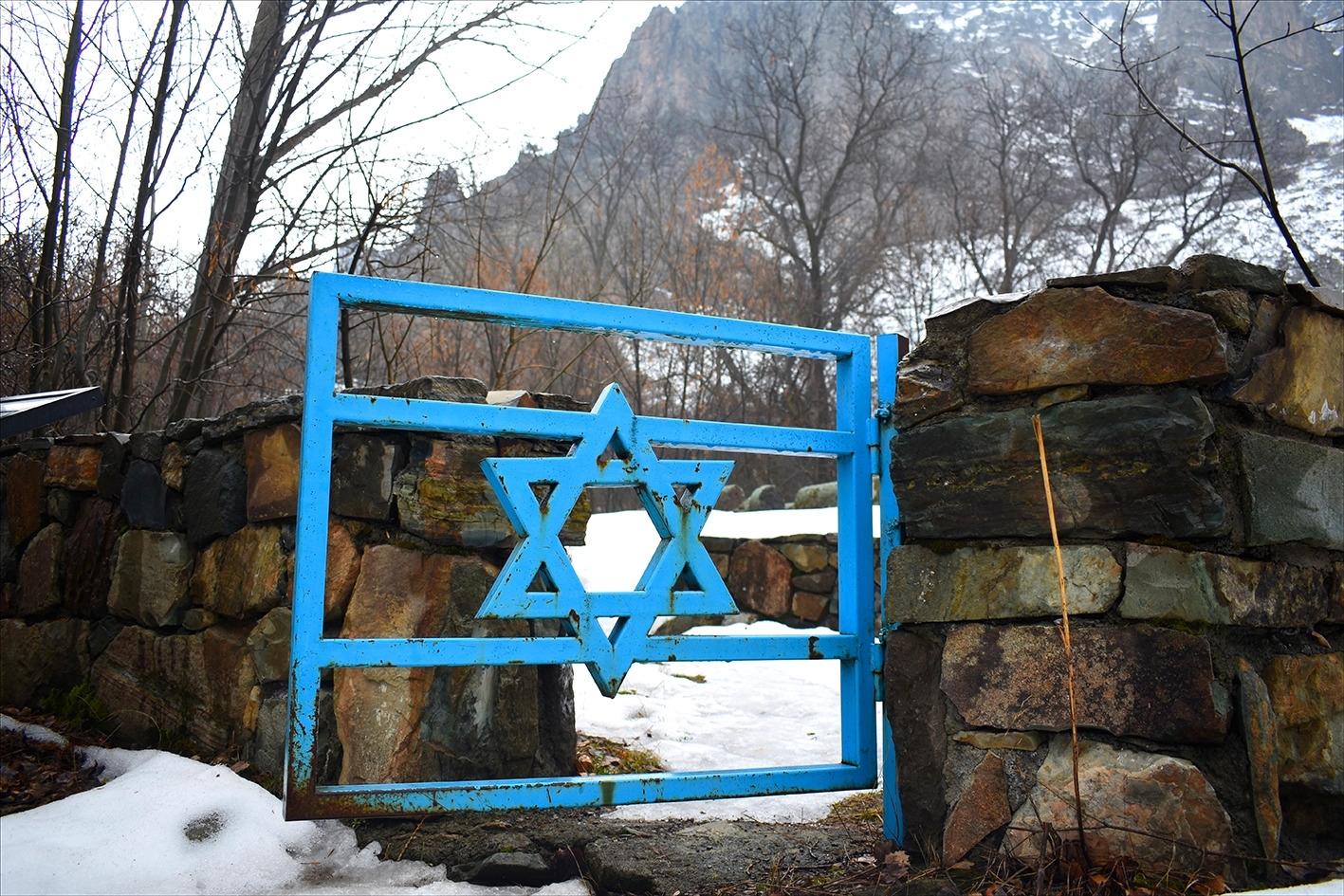A new wave of significantly growing anti-Semitism in Armenia was reported on Wednesday when ASALA-Y, the youth wing of ASALA, an Armenian paramilitary movement designated as a terrorist organization by the US, attempted to set fire to a Jewish center in the capital, Yerevan.
ASALA-Y posted footage of the attack on the Jewish Chabad center on its Telegram channel, calling it a “successful operation by fearless fighters.”
“This second operation was carried out in solidarity with the Palestinian and Lebanese resistance movements against Zionism,” it wrote. “We fully support the Palestinian and Lebanese resistance. As a sign of solidarity with them, we carried out today’s operation. And we also put up posters in Yerevan and other cities of Armenia, stating that we have a common enemy!”
The first vandalistic attack by ASALA-Y against a synagogue in Yerevan took place on October 3. At that time, members of the terrorist group were seen pouring red paint on the walls and breaking the windows of the Mordechai Navi synagogue. Israeli state radio Kan reported that the attackers also threw a Molotov cocktail into the building, attempting to set it on fire.
ASALA-Y announced that the goal of October’s offensive was “to force the rabbis of Europe to withdraw their support” for Azerbaijan’s restoration of sovereignty over the entire Karabakh (Garabagh) region.
Anti-Semitic sentiments in Armenia have been the focus of various international observers over the years. In 2018, a Pew Research Center survey revealed that 32 percent of Armenians would not accept Jews as fellow citizens. Meanwhile, the majority of the country’s population reaffirmed in the Anti-Defamation League’s (ADL) latest “Global 100” study that a variety of anti-Semitic stereotypes in Armenia are “probably true.”
Anti-Semitism in Armenia has been staggering since the Armenia-Azerbaijan war in 2020. A growing dislike of Israel has been observed in the country’s public discourse over the past three years, stemming mainly from Israel’s participation in the modernization of the Azerbaijani military.
A report by the Israeli Ministry of Diaspora Affairs regarding anti-Semitism in the Diaspora from September 10-17, 2023, pits the Armenia-Azerbaijan confrontations in August-September 2023 and in the 2020 war against each other to explain the rise of Armenian hatred against Jews.
According to the report, Armenia accused Israel of numerous cases of a close relationship with Azerbaijan. The culprits of the vandalistic attack on the synagogue in Yerevan on October 3 said Azerbaijan and Jews were “the sworn enemies of the Armenian state and people.”
In addition, the world Jewish communities' strong condemnation of Holocaust abuse for political gains in Armenia refueled the dislike of Jews in the country. Recall that amidst the intensive armament of the Armenian separatist forces in the Karabakh region, the Azerbaijani authorities installed in April a border checkpoint at the entrance of the Lachin road connecting Armenian residents of the Azerbaijani region with Armenia. The control point enabled strict control of shipments to the Karabakh region of Azerbaijan, preventing further military supplies from reaching region.
The Armenian authorities distorted the developments as an attempt by the Azerbaijani side to impose a blockade on Karabakh Armenians. Armenia’s Prime Minister Nikol Pashinyan biasedly compared the installation of the border checkpoint to the Nazi-created ghettos for Jews.
On September 7, fifty senior rabbis from 20 European countries signed a joint letter to condemn Armenia’s use of Holocaust rhetoric for political gains. In the letter, the rabbis stated that “expressions such as ‘ghetto,’ ‘genocide,’ ‘holocaust,’ and others are […] inappropriate to be part of the jargon used in any kind of political disagreement.”
The letter of the rabbis prompted a woeful response from the Armenian side. The Armenian diaspora in Europe launched a pressure campaign against rabbis who participated in public statements or signed letters. In addition, Jewish citizens of Yerevan also began to come under pressure. ASALA-Y issued intimidations of burning Jewish synagogues and targeting every rabbi across Europe.
On September 9, on the Jewish Sabbath, during prayer, an unknown Armenian burst into the vandalized Mordechai Navi synagogue to insult and threaten the Jews. Despite the incident, Yerevan authorities did not take security measures to protect the only center of the Jewish religious community. On September 17, the Israeli Ministry of Diaspora Affairs reported the deteriorating life of Jews in Armenia, warning: “There are concerns about […] violent attacks against Jewish property in the near future.”
According to World Jewish Congress estimates, about 500-1,000 Jews, mostly of Ashkenazi origin, and some Mizrahi and Georgian Jews, were registered in Yerevan. However, following the incidents, Israeli state radio Kan reported that there are only 200 Jews left in Armenia. Azerbaijani Jewish Community’s rabbi Zamir Isayev called on the last Jews in Armenia to leave the country and move to Azerbaijan, where he guaranteed them citizenship and security.







 Azerbaijan and Armenia started the process of demarcation of their border on Tuesday, with the installation of the first border markers based on ge...
Azerbaijan and Armenia started the process of demarcation of their border on Tuesday, with the installation of the first border markers based on ge...
 Armenian sappers commenced on Monday mine-clearance operations in the territories adjacent to the Saint Mary Church in village of Voskepar (Armenia...
Armenian sappers commenced on Monday mine-clearance operations in the territories adjacent to the Saint Mary Church in village of Voskepar (Armenia...
 Iran and Pakistan have signed eight cooperation documents in various fields, and agreed to strengthen ties to fight terrorism in the region.
Iran and Pakistan have signed eight cooperation documents in various fields, and agreed to strengthen ties to fight terrorism in the region.
 President Aliyev emphasized the critical role of the North-South Transport Corridor in fostering transport cooperation between Azerbaijan and Russi...
President Aliyev emphasized the critical role of the North-South Transport Corridor in fostering transport cooperation between Azerbaijan and Russi...



